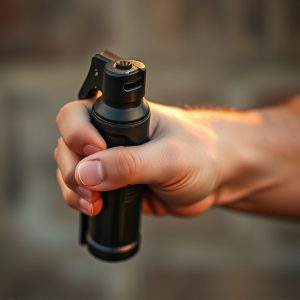Storing Pepper Spray at Home: Safety, Legal, and Equipment Guide
Storing pepper spray at home requires careful consideration of safety, legal compliance, and proper…….
Storing pepper spray at home requires careful consideration of safety, legal compliance, and proper storage practices. Follow these guidelines: keep it out of reach of children and pets, store in a secure locked area, use corrosion-resistant containers, place discreetly yet accessible, maintain optimal temperature and ventilation, regularly inspect and test, handle with care, and adhere to local laws for responsible storage and usage.
In today’s world, law enforcement pepper spray equipment has become an essential tool for self-defense. As individuals consider equipping their homes for safety, understanding how to store pepper spray properly is crucial. This guide delves into the intricacies of storing pepper spray at home, covering legal considerations, choosing the right containers, creating a comprehensive defense kit, and best practices for safe handling. By following these steps, folks can ensure their peace of mind while navigating potential risks effectively.
- Understanding Pepper Spray: Its Uses and Potential Risks
- Legal Considerations for Storing Pepper Spray at Home
- Choosing the Right Container for Safe Storage
- Creating a Comprehensive Home Defense Kit
- Best Practices for Storing and Handling Pepper Spray
Understanding Pepper Spray: Its Uses and Potential Risks
Pepper spray, also known as oleoresin capsicum (OC) spray, is a non-lethal self-defense agent that has become a staple in law enforcement and personal safety equipment. It works by causing temporary blindness, coughing, and difficulty breathing in those affected, providing users with crucial time to escape or subdue an assailant. However, understanding its potential risks is essential for safe storage and responsible use, especially when considering storing pepper spray at home.
While pepper spray is generally considered safer than other chemical agents, misuse or exposure can lead to adverse effects, including respiratory irritation, skin burns, and even panic attacks. Improper storage can also result in accidental discharge or degradation of the spray’s effectiveness over time. Thus, keeping it out of reach of children and pets and storing it in a cool, dry place is crucial when considering storing pepper spray at home.
Legal Considerations for Storing Pepper Spray at Home
When it comes to storing pepper spray at home, there are several legal considerations that every citizen must keep in mind. The first step is understanding the local and state laws regarding civilian ownership and possession of pepper spray. Some jurisdictions have strict regulations on who can own and carry these devices, as well as where and how they can be stored. For instance, certain areas may require registration or a permit for possession, while others might limit the amount or type of pepper spray allowed.
It’s crucial to store pepper spray in a secure, locked location that is out of reach of children and unauthorized individuals. This not only ensures safety but also complies with legal requirements aimed at preventing misuse. Additionally, proper labeling and documentation of the pepper spray’s contents can help avoid misunderstandings and potential legal issues. Always consult your local law enforcement agency or legal advisor to fully comprehend the regulations specific to your area.
Choosing the Right Container for Safe Storage
When it comes to storing pepper spray at home, selecting the right container is paramount for safety and accessibility. Opt for robust, leak-proof containers designed specifically for chemical storage. These should be made from materials that are resistant to corrosion and can withstand potential impacts, ensuring the integrity of the spray remains intact. Clear, hard plastic cases are often ideal as they allow for easy identification and quick retrieval while keeping the contents secure.
Consider placement strategies that prioritize both discretion and accessibility. A locked box or cabinet in a low-traffic area away from children and pets is ideal. Mounting brackets on walls or storing them under beds can also be effective, ensuring they’re within reach when needed but not easily accessible to unauthorized individuals. Regularly check the condition of your storage container, making sure it remains sealed and secure to guarantee the effectiveness and safety of your pepper spray equipment.
Creating a Comprehensive Home Defense Kit
Creating a comprehensive home defense kit is a proactive step in ensuring your safety and security. One crucial component to include is pepper spray, an effective non-lethal tool that can deter and incapacitate intruders. When storing pepper spray at home, consider placement for easy accessibility during an emergency. Keep it in a secure yet visible location, such as near an entrance or in a readily available drawer.
Remember that proper ventilation is essential when storing any type of spray. Ensure the area has ample air circulation to prevent buildup of potential fumes. Additionally, maintain the pepper spray away from heat sources and direct sunlight to prolong its effectiveness. Regularly inspect and test your home defense kit, including the pepper spray, to ensure everything remains in working order and easily retrievable when needed.
Best Practices for Storing and Handling Pepper Spray
When storing pepper spray at home, it’s crucial to keep it in a secure location that is out of reach from children and unauthorized individuals. A locked cabinet or drawer in a safe room like a bedroom or bathroom is ideal. Ensure the area is cool, dry, and well-ventilated to prevent any damage to the spray can. Additionally, store it away from direct sunlight, as heat can cause the solution to degrade faster.
Handling pepper spray requires careful consideration. Always wear gloves when dealing with the spray to avoid skin irritation or contamination. Keep the nozzle clean and free from debris by regularly inspecting and wiping it down with a soft cloth. Never point the spray at anyone unless in self-defense, as accidental discharge can cause temporary blindness and respiratory distress. Familiarize yourself with local laws regarding pepper spray use and storage for personal protection.
When it comes to storing pepper spray at home, understanding its proper use and implementing best practices is key. By keeping your equipment in a secure container and integrating it into a well-rounded home defense kit, you can ensure its effectiveness while minimizing potential risks. Remember, knowledge and preparation are essential tools for any homeowner aiming to protect themselves and their loved ones.


